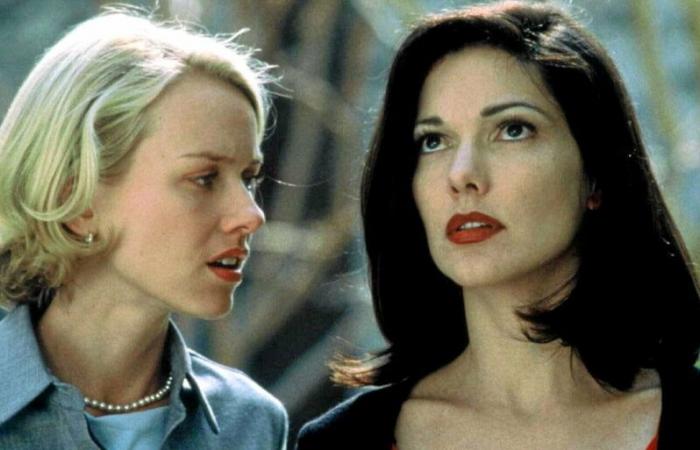Dix feature films, an iconic series… It didn’t take much to bring David Lynch into the very exclusive club of directors with unique talent. He is one of those who knew how to leave their mark on the history of the 7th art by cultivating a disconcerting, sometimes surprising, singularity. It’s difficult to make a choice from his filmography, as the adjective cult, so often overused, fits perfectly with his work.
David Lynch passed away on January 16 at the age of 78. Here is the selection (as humble as it is biased) of his films, which we advise you to absolutely (re)see.
Dune (1984)
Classified among the great failures of the Lynchian CV, a resounding commercial and critical failure which completely shattered any desire of the filmmaker to venture again towards blockbusters, Dune version 1984 ended up seeing its star shine again in the hearts of moviegoers over the years. years. A fast-paced adaptation (barely 2 hours 15 minutes!) of Frank Herbert’s monumental pavement, this space opera produced by Dino De Laurentiis and his daughter Raffaella will push Lynch to the brink of a nervous breakdown faced with the scale of the construction site and the countless struggles on set, in the Mexican desert.
The script faithfully follows the novel, even if Lynch has to cut through Herbert’s prose with great strokes: in a very distant future and an equally remote galaxy, the young Paul Atreides (Kyle McLachlan), from the dynasty of the same name , becomes the messiah of an entire people oppressed on the sand planet Arrakis by the cruel Baron Harkonnen. At the time, with his baroque bias and an artistic direction considered cheap, David Lynch surprised some but above all disappointed the many others who did not find the scale and grandeur expected.
Mocked by the press, abandoned by its producers and even snubbed by Frank Herbert, Dune has enjoyed a new life for around ten years with a renewed court of fans who appreciate its retrofuturistic side, the total bizarreness of certain typically Lynchian scenes (all those by the terrifying Baron Harkonnen in particular) and the techno-rock soundtrack co-signed by the group Toto and Brian Eno. To rediscover, forty years after the crash!
Blue Velvet (1987)
From its first sequence, Blue Velvet unhorses and announces the color. The camera wanders through the garish colors of an American residential neighborhood before plunging into the dark grass of a cheerful garden to encounter voracious insects and suddenly stopping on a human ear, visibly torn off.
Blue Velvet which sneaks in among the severely burned blockbusters of 1987, tells the story of the adolescent Jeffrey Beaumont (Kyle MacLachlan, the favorite actor) who becomes aware, while spying on the bewitching Dorothy Vallens (unforgettable Isabella Rossellini) that the The small town he inhabits, as peaceful as it may seem, is home to a number of characters with questionable morals. And among them, a sadistic killer. He doesn’t need more to lead the investigation, flanked by Sandy (debutant Laura Dern) to try to unravel the mysteries of the place.
Non, Blue Velvet is not a thriller like the others – is it one anyway? It is closer to the sticky little thriller which will force itself to quietly tear apart the seams, ultimately not so strong, of the American Way Of Life. Because with Lynch, appearances have no choice but to be deceptive.
Sailor et Lula (1990)
Nicolas Cage, Laura Dern, a thrilling ride: Sailor et Lula (Wild At Heart in its original version), it was a Romeo and Juliet, or a Wizard of Ozunder Lynchian influence. Suffice it to say, a work that could not resemble any other. Palme d’Or in 1990 at the Cannes Film Festival, this love story taken from the novel by Barry Gifford remains, with Lost Highway, the most rock’n’roll film of its author.
This imitation fairy tale, a road movie more than classic in form, was enhanced by lyricism and colorful, excessive characters, as they would never have been in David Lynch’s filmography. To the sound of Love me Tender or the riffs of Slaughterhouse, Sailor and Lula, if it will not remain the most esteemed film of its creator, can pride itself on being at least an insatiable source of joy. That of mad love, its excesses, its dreams and its disillusionments. Of a life, and a film, lived passionately.
Lost Highway (1997)
His artistic peak, for many of his fans, David Lynch will reach it with this mind-boggling schizophrenic nightmare. Co-signed by Lynch and Barry Gifford (poet author whom Lynch had already adapted with Sailor et Lula), Lost Highway starts from an enigma: a mysterious call received at his marital home by a saxophonist from Los Angeles. The voice on the telephone only utters one sentence: “Dick Laurent is dead”. And the film unfolds a mental descent into hell for his musician and his wife Renée (scorching Patricia Arquette), who receive at home an equally mysterious and most sulphurous K7 video…
The plot, framed in cinemascope, immerses us between free-jazz and neo-noir atmosphere, while flirting with fantasy and terror, as well as the filmmaker’s pictorial fascination for the iconic city of angels, as in many of his most elevated works. Erotic, frightening, unfathomable, hypnotic, Lost Highway loses us in the middle of the Californian night through a brutal reversal of point of view halfway through and ends quickly with a multitude of unanswered questions. The spectator doesn’t care, he is captivated to the bone by Lynch’s mastery in leading us by the tip of his nose while we don’t even understand the bottom of the matter. All that matters are the states through which this lost highway takes us, from deep anguish to excitement of the senses… Unique!
A true story (1999)
Who said Lynch was an inaccessible director? With A true story, released in 1999, the great Lynch breaks preconceived ideas and cracks the armor. With a moving film, as simple as crossing the United States on a lawn mower. The true story is that of Alvin Straight, a 73-year-old veteran, who lives with his daughter Rose in a small town in Iowa. The day he learns that his brother, with whom he has not communicated for ten years, has been the victim of an attack, he decides to go find him. Bad eyesight, no driving license, he decides to travel hundreds of kilometers sitting on his lawn mower, the only means of transport allowed to him.
This great film, unlike any other, which Disney had ensured was broadcast in American cinemas, suddenly threw a flash of light into David Lynch’s filmography. Here there is no twisting plot, no complex subtext, no dark plans. A true story shines: shines with its simplicity; shines with its message which goes straight to the hearts of the spectators, without embellishments and without tear-jerking scenes.
To play his key character, David Lynch sets his sights on Richard Farnsworth, a former stuntman made famous by his (second) role as sheriff in the stifling Misery by Rob Reiner (1991). The actor is then ill, but he carries the film on his shoulders and never strays from the task entrusted to him by the director: to remain simple, moving and… true.
Mulholland Drive (2001)
To Discover
Kangaroo of the day
Answer
A violent car accident, a woman with amnesia, a beginner actress with dreams of grandeur in Hollywood… The new millennium had barely begun, David Lynch had proven with Mulholland Drive, probably the most acclaimed film of his career, that he should be counted on. Mixing fantasy and film noir, this “love story in the city of dreams” will undoubtedly have been the filmmaker’s total accomplishment. Rarely has he achieved such symbiosis with his lifelong composer, Angelo Badalamenti. Rarely has his taste for everyday life shrouded in dreaminess been in such perfect balance. Finally, never has the mystery of his works, of his complex scenarios, so fascinated spectators.
He will have achieved the (rare) feat of bringing together the most demanding film buffs and neophytes. “Hollywood is hell”, is written on a sign, visible for a few seconds in the film. The message has gotten through. David Lynch intended to break a myth, built on poverty, and show it as it is: a nightmare. From which no spectator, until now, will have recovered.






